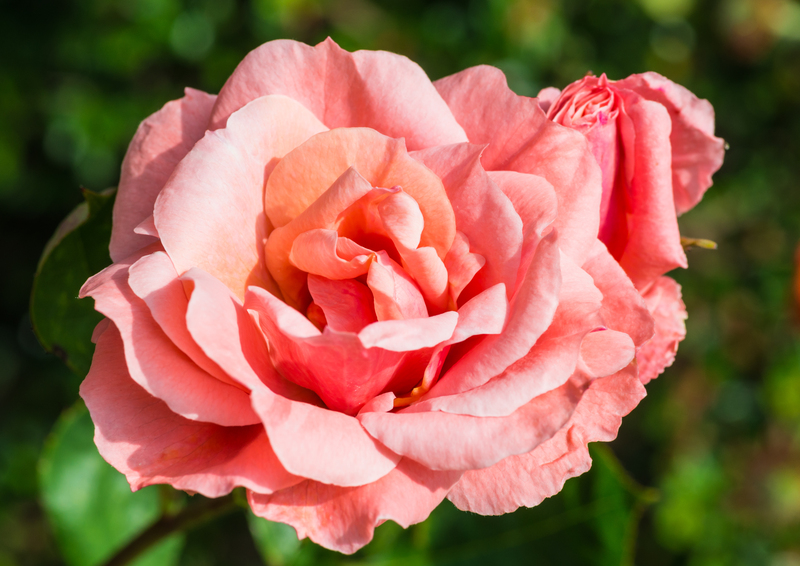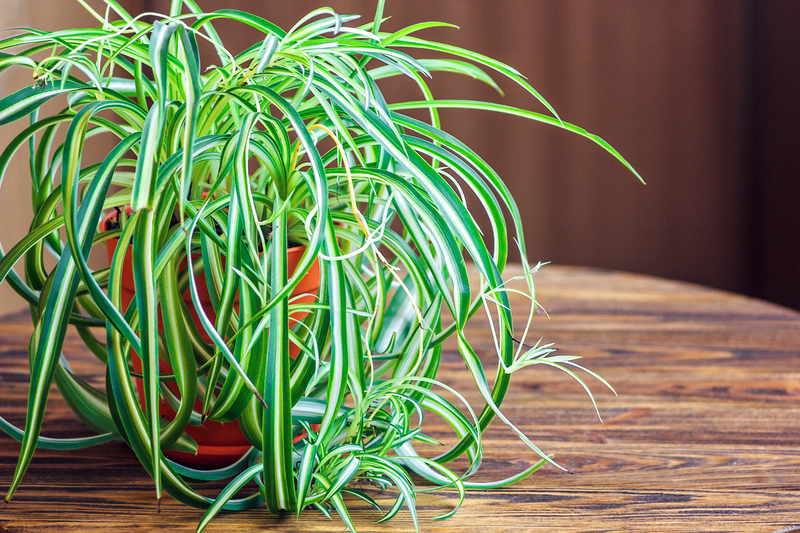Transforming Small Spaces into a Lush Herb Garden
Posted on 19/09/2025
Transforming Small Spaces into a Lush Herb Garden: A Comprehensive Guide
Have you always dreamed of having your own lush herb garden but feel limited by a lack of space? Whether you live in a cozy apartment, have a balcony, or simply a small patio, creating a thriving herb garden in tight quarters is absolutely achievable. In this article, we'll walk you through everything you need to know about transforming small spaces into productive, beautiful herb gardens. With practical tips, expert advice, and creative inspiration, you'll be harvesting fresh herbs in no time!

Why Choose an Herb Garden for Small Spaces?
Herbs are arguably the best crops for budding urban gardeners because they:
- Require minimal space compared to vegetables or fruit.
- Have shallow root systems, making them ideal for containers or vertical setups.
- Grow quickly, offering almost instant gratification.
- Can be grown both indoors and outdoors.
- Provide fresh, nutritious flavorings for your meals.
- Improve air quality and add greenery to your living environment.
With these benefits, small-space herb gardening is a smart and satisfying choice.
Assessing Your Space for Herb Garden Potential
Before you start planting, take a good look at your available space. Successful compact herb gardens start with good planning. Ask yourself:
- How much sunlight does the area receive? Most herbs need at least 4-6 hours of direct sunlight.
- Is the space indoors by a window, a kitchen counter, a balcony, or an outdoor patio?
- Can you use vertical space or hanging solutions?
- Do you have a source of water nearby for easy care?
Don't overlook unusual locations! Window sills, tops of shelves, or even stair railings can all be transformed into productive herb garden nooks.
Choosing the Right Herbs for Small Spaces
Not all herbs are created equal when it comes to compact spaces. The following are top-performing herbs for confined environments:
- Basil - Thrives in containers and is essential for pesto or salads.
- Mint - Grows vigorously but should be contained to avoid taking over.
- Parsley - Perfect for window planters.
- Chives - Compact and quick-growing, great for indoor gardening.
- Thyme - Low-growing and tolerates less frequent watering.
- Cilantro - Fast-growing but prefers cooler temperatures.
- Oregano - Hardy and doesn't require deep soil.
- Rosemary - Upright variety does well in pots with drainage.
- Dill - Suitable for tall or hanging pots.
Choose 2-4 herbs based on your culinary preferences and the conditions in your space. Don't overcrowd your containers - herbs need some room to grow.
Design Ideas to Maximize Small Spaces
Vertical Herb Gardens
One of the best strategies for herb gardening in small spaces is to go vertical. By building up instead of out, you can achieve a stunning green wall even in tight quarters.
- Hanging planters - Suspend small pots from racks, rods, or repurposed ladders.
- Pallet gardens - Reuse a wooden pallet for a rustic vertical centerpiece. Staple landscaping fabric to the back and fill with soil before adding herbs.
- Pocket planters - Fabric or felt pockets designed for wall mounting, each pocket supporting a different herb.
- Stacked pots - Terra cotta or plastic pots arranged on stands or stacked to create multiple tiers.
Windowsill Herb Gardens
Windowsills are classic small herb garden spaces. Choose narrow, trough-style planters to fit the window and receive maximum sunlight. If possible, select a south or west-facing window.
Rail Planters and Balcony Solutions
Make use of balcony railings and fences with:
- Clip-on railing planters for a sleek and modern look.
- Hanging baskets packed with trailing herbs like thyme or oregano.
- Shoe organizers - The pockets are perfect for herbs and turn any wall or fence into a growing space.
Creative Indoor Herb Garden Solutions
- Mason jars lined up on a kitchen shelf or ledge.
- Magnetic containers - Stick directly onto the fridge.
- Teacups or repurposed mugs - Add charm and functionality to your countertop.
Creative, vertical, and container gardening ideas multiply your herb output, even in the tiniest apartments!
Essential Tips for Creating a Lush Herb Garden in Small Spaces
1. Prioritize Quality Soil and Drainage
Herbs thrive in loose, nutrient-rich soil with good drainage. Whether container or vertical, ensure each planter:
- Has multiple drainage holes to prevent root rot.
- Uses a high-quality potting mix (avoid heavy garden soil).
- Is topped with a thin layer of mulch or pebbles to retain moisture.
Proper drainage is key to a lush, healthy small space herb garden.
2. Maximize Sunlight
As a general rule, herbs love abundant sunlight. To create lush growth:
- Rotate indoor containers weekly to ensure even light exposure.
- If sunlight is limited, consider grow lights (LEDs or fluorescents) for supplemental light.
- Always place planters near the brightest available spot--south-facing windows are best.
3. Water Wisely
- Consistency is more important than quantity - check soil moisture before watering.
- Most herbs prefer slightly dry soil - avoid overwatering!
- If growing in vertical systems, be sure that upper containers do not drown the lower ones.
Use self-watering planters or add a simple tray under pots to collect excess water.
4. Prune and Harvest Regularly
The secret to a lush small space herb garden is routine harvesting. Snipping regularly:
- Prevents herbs from flowering and becoming woody.
- Encourages bushier, more vigorous growth.
- Reduces pests and diseases by increasing air circulation.
Remember, most herbs thrive when harvested; don't be shy!
5. Feed for Foliage
Feed herbs with a diluted, organic liquid fertilizer every 3-4 weeks to maintain lush, aromatic leaves. Avoid over-fertilization, which can lead to weak growth.
Making the Most of Urban Small Space Herb Gardens
Container Gardening Hacks for Herbs
- Pair herbs with similar needs (e.g., thyme and oregano) in the same pot.
- Try self-watering planters or add moisture-retentive crystals for less frequent watering.
- Repurpose food cans, buckets, or baskets for a rustic, eco-friendly look.
- Group fragrant herbs by your door or window for natural aroma and pest deterrence.
Seasonal Adjustments for Year-round Herbs
In cool climates, transition your mini herb garden indoors during autumn. Woody herbs like rosemary and thyme adapt well to winter windowsills, while basil and cilantro may prefer supplemental lighting.
Companion Planting and Pest Prevention
- Mix pest-repelling herbs like basil or mint with more delicate varieties.
- Harvest regularly to prevent crowding and improve airflow.
- Monitor for common pests like aphids and treat with Neem oil or gentle soap sprays if needed.
Best Varieties for an Urban Herb Oasis
To fill your herb garden in a small space with diversity, experiment with:
- Miniature basils (e.g., Greek basil) for compact growth.
- Lemon thyme or purple sage for unique color and scent.
- Microgreens (fast, nutrient-packed) as a supplemental crop.
- Stevia or edible flowers like nasturtiums for added interest.
DIY Projects: Easy Ways to Start Your Small Space Herb Garden
1. Shoe Organizer Herb Garden
- Hang a fabric shoe organizer on a sunny balcony wall.
- Fill each pocket with potting mix and a single herb plant.
- Water gently and watch your vertical oasis thrive.
This is affordable, space-saving, and extremely accessible for beginners.
2. Upcycled Can Herb Planters
- Clean and paint empty tin cans for visual appeal.
- Punch drainage holes in the bottom and add pebbles for extra drainage.
- Plant with your favorite herbs and line up on a windowsill or shelf.
Give new life to household items while growing herbs right in your home!
3. Pallet Vertical Garden
- Secure a wooden pallet to an outside wall or fence.
- Staple landscape fabric to the back and fill with rich soil.
- Plant different herbs between the slats for a spectacular living wall effect.
A vertical herb garden like this maximizes every inch of your outdoor area.

Maintaining a Lush Herb Garden: Troubleshooting & Pro Tips
Common Challenges
- Wilting or yellow leaves? Usually signals overwatering or poor drainage.
- Stretched, spindly growth? Increase light exposure or supplement with grow lights.
- Slow growth? Feed with a diluted organic fertilizer every month.
- Pests? Isolate affected plants and treat with gentle, organic sprays.
Pro Tips For Lush Results
- Harvest herbs in the morning for peak flavor.
- Pinch back basil and mint regularly to encourage bushy growth.
- Keep a journal or calendar to track watering and feeding schedules.
- Preserve your harvest by freezing, drying, or making herby oils for year-round use.
Conclusion: Reap the Rewards of a Lush Herb Garden--No Matter Your Space
Creating a lush, productive herb garden in a small space is both possible and deeply rewarding. By making smart choices about herbs, containers, sun exposure, and vertical design, even the smallest urban nooks or shaded indoor corners can burst with green abundance. Fresh, homegrown herbs uplift your meals, improve your air, and transform your environment--while connecting you to nature in the heart of the city.
Get started today! Your lush, small space herb garden awaits. With these tips and ideas, a bounty of basil, thyme, mint, and more is within easy reach, wherever you live.

